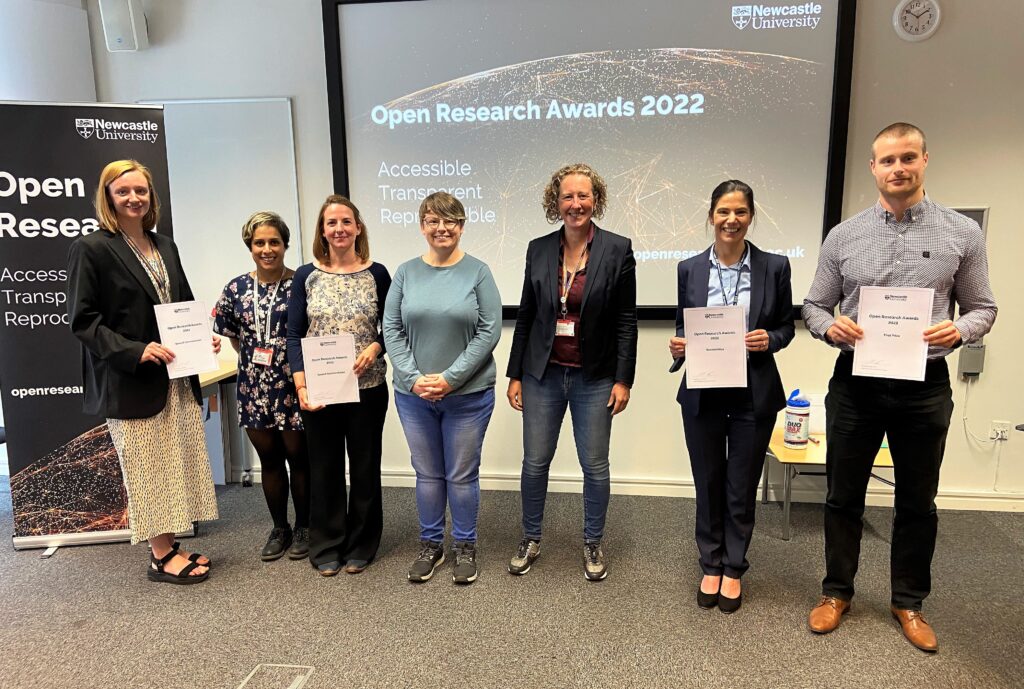
The inaugural Newcastle University Open Research Awards culminated in a celebration event where candidates shortlisted for an award we invited to present their case studies. We heard excellent presentations on the benefits and challenges of making research more open from postgraduates and researchers working in a range of disciplines and the winning case studies are presented below.
We’d like to thank all of the candidates who submitted a case study. The submissions we received were all of a high standard and we were delighted by the range of open research practices they described. We’d also like to thank the awards panel (Dr Stephen Parnell, Professor Neil Boonham, Dr Chris Emmerson and Jill Taylor-Roe) for their help with the very difficult job of choosing the winners.
These awards were made possible thanks to Newcastle University’s QR Enhancing Research Culture Project Fund 2022 in support of the University’s developing Research Culture Action Plan. A key strand of this plan seeks to make our research more transparent and reproducible and our data more accessible, to facilitate re-use and extend impact.
Award Winning Case Studies
Special commendations
Lenka Pelechova, Leanne Hobbs, Nadia Rostami, Natalie Partridge
This case study described the design of open version control software to facilitate increased transparency in Cell Engineering. The panel felt this case study gave an excellent account of how this innovative open approach would increase public trust in research in a discipline where this is vital.
Courtney Neal
The panel felt this case study gave a frank and refreshing take on being open from the very start of a research project. It clearly outlined the benefits of openness through study pre-registration and replication. Although not part of the award criteria, it was heartening that a postgraduate student has adopted these principles so quickly in their research career.
Third prize winner
Elizabeth Lewis
This case study described the challenges and societal benefits of combining climate data from diverse sources and adapting them so that they were suitable for release as open datasets with associated open software. The panel also commended their commitment to training early career researchers in open practices.
Second prize winner
Renae Stefanetti
Led by Renae J. Stefanetti (Exercise Physiologist), Alasdair Blain (Statistician), Linda Errington (Medical librarian), Laura Brown (Trial Manager), Jane Newman, Cecilia Jimenez Moreno (Physiotherapists), Robert McFarland (Paediatric Neurologist), Yi Shiau Ng, Doug Turnbull, and Gráinne S Gorman (Adult Neurologists).
This case study described a wide range of open research practices within their research, including open peer review, open access publication, the sharing of data and fully documented code and the creation of an interactive database of systematic review data. The challenges and benefits of these approaches were well articulated and it offered an excellent example of a group adopting the principles of open research.
First prize winner
Sam Orange
Our winning case study described a consistently open approach across several research projects, using a wide range of open practices. They showed a clear understanding of the challenges, offered pragmatic solutions to overcome them and made a strong case for open research as a means to promote scientific progress. They also demonstrated a commitment to championing open research with both colleagues and students
Our thanks also go to Professor Candy Rowe, Dean of Research Culture and Strategy for helping us present these awards and for enabling them through funding from the University’s QR Enhancing Research Culture fund.
And the talks from all our shortlisted entrants were terrific and really inspiring-well done to everyone who entered and took part, and a big shout out to @sboneham and @ChrisJEmmerson who had the idea and brought it to fruition so brilliantly!
— Candy Rowe (@CandyRowe_) July 5, 2022
